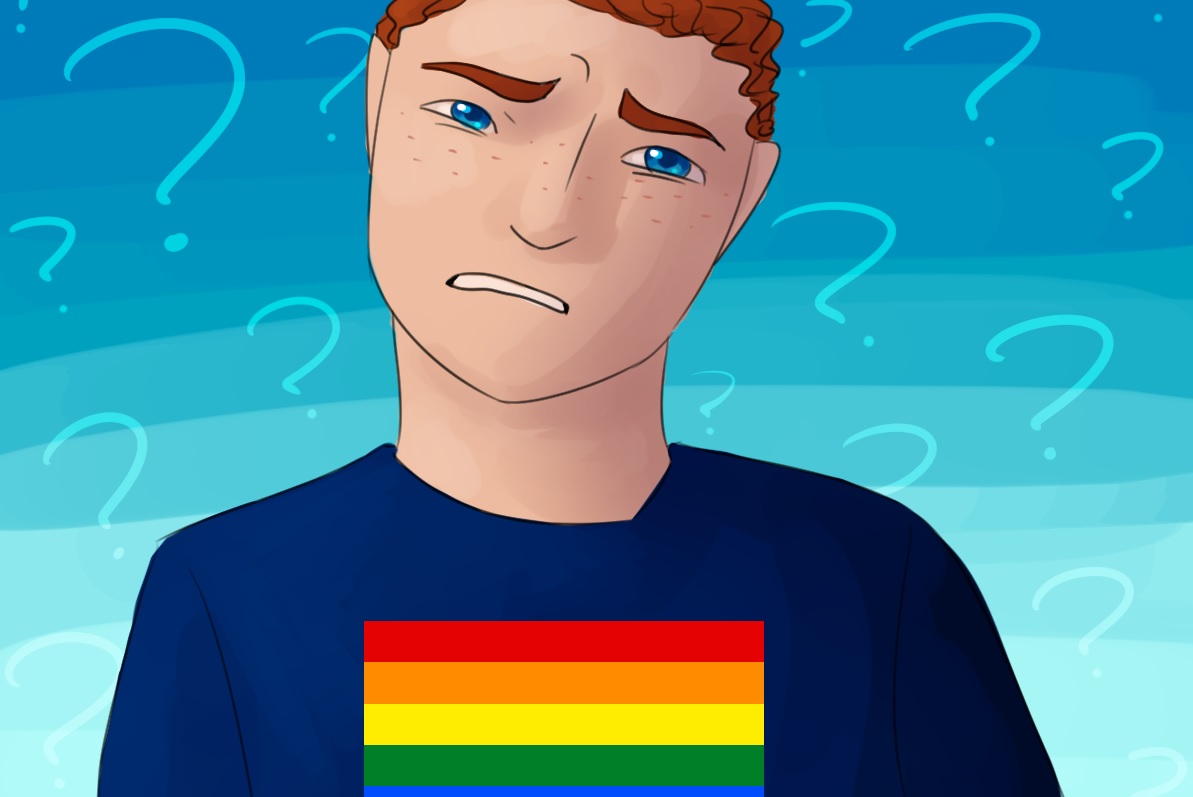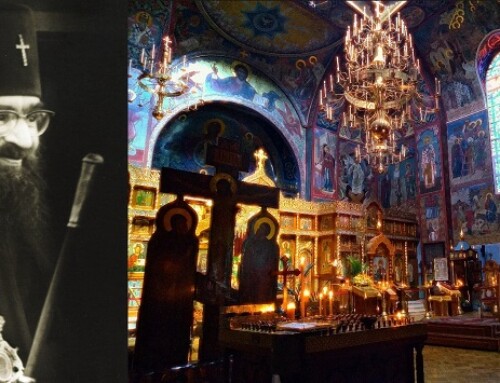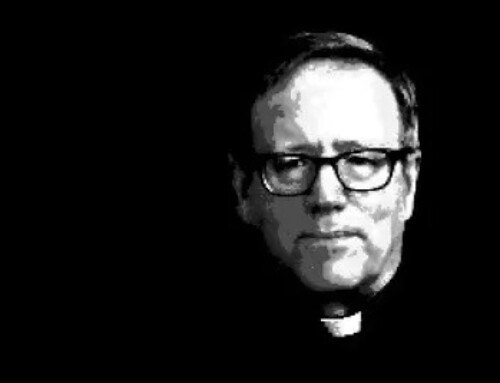When I returned to the Catholic Church in 1999, after an ineffectual childhood in the California parochial school system, and after a decade in the “gay” lifestyle, at best – what I found in the Church was a group of sometimes well-intentioned, but incredibly inconsistent priests whose advice ranged from the solidly orthodox to the wildly liberal: the first priest I talked with, as I literally sat before him with my hemorrhaging anus, told me that I was “gay,” I had been born that way; that I should go back, and try to temper it a bit. Although I was completely uneducated on what the Church taught on the subject, the nearness of death gave me a certain clarity and I knew instinctively that he was wrong. Soon after, I went to talk with another priest, a humble man who had been rather rejected by the majority of the diocese; what he told me was radically different: that I needed to change my life, go back to the Sacraments, and to definitively make a complete break with my old life; he suggested (actually he demanded) that I move out of San Francisco and go back to my parents’ home.
Even though I did as the priest told me to do, the attachment the “gay” life had on me was incredibly strong; for example, I stopped having sex, but I still considered myself “gay.” Part of me wanted to believe, desperately wanted to believe, in what that first priest had said: that I indeed had been born “gay.” It was not so much an obstinate belief in the validity of the homosexual orientation, but a resolution that “gay” was an integral part of my identity. In the “gay” world of the late-1980s and 90s, I had lost many friends to AIDS, to now completely abandon “gay” was, in my mind, to abandon them – to disregard their sacrifices. This false loyalty to “gay” went part and parcel with a stubborn unwillingness to fully admit the Truth about “gay:” that it was not something I had been born with; that in actuality, I had been a lonely and frightened little boy who, when he got older, remained lonely and frightened, and then, in a deliberate act of desperation, went into “gay” thinking that I would find happiness there; I never did. The meaningless destruction of all my friends, while still in their 20s, was not evidence of some noble martyrdom, but of how deeply deceived we had all been.
During this time, when I was still attached to “gay,” I never lived with joy, I simply drifted from one day into the next; I missed my old friends, I missed the comradery, and I missed not being alone. Suddenly, there appeared a newly ordained priest – a local boy who had returned home to give a talk on the demonic. I heard about him, so I decided to go; perhaps, in the back of my mind, I was hoping for something; what it was, I didn’t know – possibly, just listening to him would uncover some hidden truth that I had not discovered; I didn’t know, but I was desperate. I showed up late, sat down in the last row and found his talk interesting, but not really what I was looking for. Only, what was I looking for? Afterwards, I waited for most of the audience to leave and then I went up to the priest and told him a little about myself and my history. Next, it was odd, but he became very stone-faced, asked if he could pray over me – and, then, asked another man to accompany the two of us into a small backroom. A little while later, when I walked out of that room, I knew that I had been healed: through this man, Our Lord Jesus Christ freed me from the last bonds of homosexuality and my lingering attachment to “gay.” It was over, and, now, my life could begin again.
AMORIS LÆTITIA
The recent apostolic exhortation, AMORIS LÆTITIA, speaks briefly to the problem of homosexuality; first, it’s important to note that this exhortation arrives after a series of contentions Synods where more liberal-thinking Bishops pushed for an overall tone of mercy and non-judgment typified by Bishop Lucas Van Looy of Ghent who said: “We learned in this synod not to judge. Who are we to judge?” This laissez-faire attitude is contrasted with the more strident calling-out from many of the Eastern European and African Bishops symbolized by Cardinal Robert Sarah of Guinea who unequivocally stated: “What Nazi-fascism and communism were in the 20th century, Western homosexual and abortion ideologies and Islamic fanaticism are today.” One is clearly refusing to make any sort of judgment and the other is clearly recognizing evil for what it is.
In AMORIS LÆTITIA, I see a sort of comprise between those two camps: in section #251, there is a strong condemnation for equating same-sex unions with heterosexual marriages; special attention is payed to the pressure placed on countries, primarily those in Africa, who civilly outlaw such “gay” marriages, to change their laws or forgo any and all forms of international aid. But, preceding this section is a more ambiguous statement which I think is directed towards the more “gay” affirming West. For myself, the first problem is with the statement “…regardless of sexual orientation.” This implies that there is more than one sexual orientation; in the 1986 Letter to the Bishops on Pastoral Care for Homosexual Person, the Congregation from the Doctrine of the Faith stated:
The human person, made in the image and likeness of God, can hardly be adequately described by a reductionist reference to his or her sexual orientation…Today, the Church provides a badly needed context for the care of the human person when she refuses to consider the person as a “heterosexual” or a “homosexual” and insists that every person has a fundamental Identity: the creature of God, and by grace, his child and heir to eternal life.
Saint John Paul went even further when he said: “The body, and it alone, is capable of making visible what is invisible, the spiritual and divine. It was created to transfer into the visible reality of the world, the invisible mystery hidden in God from time immemorial, and thus to be a sign of it” In other words, there is no other sexual orientation than the one which God genetically encoded upon our bodies; homosexuality, if it is anything, simply remains a mental disorder that, because of social and political pressure, has been elevated beyond the rank of a treatable neurosis; with regards to our eternal soul, homosexuality is a “…strong tendency ordered toward an intrinsic moral evil.”
Second, there is also an inherent ambiguity in the recommendation for “respectful pastoral guidance.” What exactly does that mean? In my experience with horrendously divergent priests and parishes, with respect to the “gay” question, this can mean vastly different approaches to different prelates and priests. While some will regard these directives correctly as a call towards imparting both Truth and charity, others will see it as license to make it up as they go along. For instance, there is a propensity for some “Catholic” organizations to outwardly adhere to Catholic teachings while simultaneously, in practice, undermine or altogether ignore them. The 1986 Letter to the Bishops warned of such organizations:
A careful examination of their public statements and the activities they promote reveals a studied ambiguity by which they attempt to mislead the pastors and the faithful. For example, they may present the teaching of the Magisterium, but only as if it were an optional source for the formation of one’s conscience.
This attitude, which the Letter cautioned against, was somewhat surprisingly exhibited recently by Archbishop Blase Cupich of Chicago when he argued:
“When people who are in good conscience working with a spiritual director come to a decision, then they need to follow that conscience. That’s the teaching of the Church. So in the case of people receiving Communion in situations that are irregular that also applies. The question then was: Does that apply to gay people? My answer was: they’re human beings too. They have a conscience. Thy have to follow their conscience.”
The possible materialization of this “pastoral” approach could become a concrete reality because of the inherent ambiguity in section #79 of AMORIS LÆTITIA which leaves a lot up the priest when discerning “…the complexity of various situations.” From my own experience, and from the experiences of many other “gay” and ex-gay men who I have known and talked with, priests with a predisposition towards “gay” apology will oftentimes disregard explicit Church teachings in favor of a more “pastoral” approach which condones so-called “gay” monogamy as a favorable alternative to the bar and bathhouse scene. I myself was once told by a Catholic priest, somewhat early in my “gay” life, that I should try to “settle down” with one man. This sort of approach was notably taken up by Cardinal Christoph Schönborn of Vienna when he was asked about a “gay” friend who recently married another man: “It’s an improvement. They share a life, they share their joys and sufferings, they help one another. It must be recognized that this person took an important step for his own good and the good of others…”
Part and parcel with this practice is a relegation of the priest as a sort of benign facilitator; in my own backyard, within the Archdiocese of San Francisco, the former pastor of Most Holy Redeemer Parish, a predominantly “gay” congregation in the Castro District, said that when he arrived at the church he decided: “We didn’t come here to change anybody.” This mentality came out through some of the parish’s spiritual life programs and meetings – where, oftentimes, under the auspices of a priest, conversations went entirely out of control to include the most vulgar and specious arguments in support of some incredibly bizarre sexual practices. The rationale behind the support for such meanderings always goes back a strange maxim extolled by one of the attendees – that kindness always trumps the truth; the priest facilitator passionately agreed. What I saw here was no effort at correction, even in its most nonthreatening form; rather what pervaded is this ugly form of misplaced charity that sees any judgment as fundamentally bigoted and narrow minded. Interestingly, Cardinal Sarah once said: “If there’s no repentance, there’s no mercy.”
Lastly, the whole section on homosexuality ends with another ambiguous phrase: “…receive the assistance they need to understand and fully carry out God’s will in their lives.” Again, what does this mean? And, what type of “assistance” are they talking about? Again, I am afraid that this will be interpreted under the shadow of section #79 which states that priests “…avoid judgements that do not take into account the complexity of various situations, and they are to be attentive, by necessity, to how people experience and endure distress because of their condition.” Again, I have already seen where this can become perverted to include all sorts of loose interpretations which have included the “blessing” of “gay” unions, inside a Catholic church, by Catholic priests. In his book “All Things to All People: The Catholic Church Confronts the AIDS Crisis,” former Catholic Mark R. Kowalewski wrote: “Even individual dissent among priests on the church’s sexual teachings does not always result in a belief that the church should compromise its teachings in public arenas. Priests believe that official church teachings should be proclaimed in these settings. While many of these priests allow for a lesser-of-two-evils approach in pastoral counseling situations, such as allowing gay men to live in monogamous gay unions and still participate in the life of the church…” This discussion within the context of the AIDS crisis is fundamental, because, in my opinion, during that era, many well-intentioned, but albeit highly misguided priests, began to advocate just such a pastoral approach; this is somewhat divergent from the earlier dissent promoted by the likes of Fr. John J McNeill, who later came-out as “gay” himself, where there was clearly a personal stake in the approval of the whole “gay” experiment; however, in the AIDS crisis, some priests began to confuse charity with capitulation. I think the right sort of balance has been achieved in the recently released document from the Archdiocese of St. Louis which sees Christ’s encounter with the woman caught in adultery as the model of Catholic pastoral outreach to the gay community: “Providing a safe spiritual space – one that is on the path of the Gospel – is also an essential step in providing pastoral care, because anything that is not truthful cannot ultimately be pastoral.”*
Author’s note: From my experience, I wish that the Church, on homosexuality, would always begin from a place of strength, of certitude, of intransigence, of clarity, of even harshness. My first exposure to Catholicism, after being saved from “gay,” was actually picking up “The Catechism of the Catholic Church,” and immediately turning to the section on homosexuality and seeing that now much maligned word “disordered.” Recently, even Archbishop Charles Chaput of Philadelphia when questioned about the term “intrinsically disordered,” in reference to homosexuality, said:
“I think it’s probably good for the Church to put that on the shelf for a while, until we get over the negativity related to it…That language automatically sets people off and probably isn’t useful anymore.”
In reality, I found it fundamentally liberating – finally, after years of gorging on the empty “gay” lies from the secular world, here was the Truth; it was difficult to accept, but that didn’t make it less true. In my opinion, especially “gay” men, because we were wounded by our Fathers, male peers, and other men, we have a peculiar need for affirmation – especially male affirmation; for this reason, there is great propensity in the “gay” community for younger man to be ushered into the lifestyle by older, “benevolent,” males – who we often call “daddy” during sex. This need for approval often gets transferred to all aspects of our lives – most explicitly, if our parents do not approve, even celebrate our gayness, we will cut them off. This need also pops up with the homosexual view of institutions; for example, the government must approve of us by allowing “gay” marriage; in my era, it was the megalithic and macho identity of the military which must become “gay” accepting through the inclusion of openly homosexual soldiers. Part and parcel is an underlying desire for the acceptance of homosexuality within the Church – the greatest achievement being the full inclusion of homosexuality within Catholicism which is seen as the most historically homophobic. This obsession with Catholicism is somewhat strengthened because of the “father” image symbolized within the priesthood; with the priest standing-in for our unloving and condemning biological fathers. What we need from our Fathers, is what every wayward child needs from their parents; not dialogue about how or why we did something, perhaps, that can come later – but correction combined with healing; when a child gets into trouble and then gets hurt, a good parent will correct them and, then, they go about bandaging the wounds. I think ambiguity can be seen as weakness or even a willingness to change. During an interview from 2015, Fr. Donal Godfrey, a rabidly pro-gay apologist, said: “As a church we need to accept that family goes beyond traditional lines. I don’t expect the teachings to jump to acceptance in one day, it will take decades. In the meantime we need to accept people pastorally as they are and where they are. For now, this would be sufficient. Later the teachings will catch up and evolve.”
St. Josemaria Escriva said: “To heal a wound, the first thing to do is to clean it well, including a wide area around it. The surgeon knows that the cleaning hurts, but he also knows that there will be worse pain later if it is not done.” This is remarkably similar to what St. Francis de Sales wrote, here quoted by the saintly Fr. John Harvey in his book “Homosexuality and the Catholic Church:” “So also a soul that hopes for the honor of being made spouse of the Son of God must ‘put off the old man and put on the new’ by forsaking sin and removing and cutting away whatever obstructs union with God. For us the beginning of good health is to be purged of our sinful tendencies.”
250. The Church makes her own the attitude of the Lord Jesus, who offers his boundless love to each person without exception. During the Synod, we discussed the situation of families whose members include persons who experience same-sex attraction, a situation not easy either for parents or for children. We would like before all else to reaffirm that every person, regardless of sexual orientation, ought to be respected in his or her dignity and treated with consideration, while ‘every sign of unjust discrimination’ is to be carefully avoided, particularly any form of aggression and violence. Such families should be given respectful pastoral guidance, so that those who manifest a homosexual orientation can receive the assistance they need to understand and fully carry out God’s will in their lives.
79. “When faced with difficult situations and wounded families, it is always necessary to recall this general principle: ‘Pastors must know that, for the sake of truth, they are obliged to exercise careful discernment of situations’ (Familiaris Consortio, 84). The degree of responsibility is not equal in all cases and factors may exist which limit the ability to make a decision. Therefore, while clearly stating the Church’s teaching, pastors are to avoid judgements that do not take into account the complexity of various situations, and they are to be attentive, by necessity, to how people experience and endure distress because of their condition.”
*https://archstl.org/files/field-file/HOPE%20AND%20HOLINESS%20BOOKLET%20FINAL.pdf






Joseph, I am anxious to know what impact AMORIS LÆTITIA will have on the work of the Courage Apostolate.
I hope my fears will not come to pass
I was able to find good advice from your blog posts.